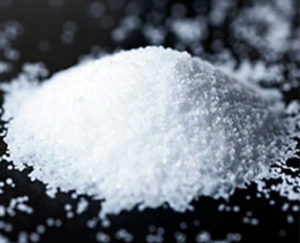 Researchers from Stanford University have developed an inexpensive alternative to lithium-ion batteries that could better help us prepare for a renewable energy future. The group was able to create a sodium-based battery that can store the same amount of energy as a lithium-based battery at less than 80 percent of the cost. Other researchers have created sodium-based batteries in the past, but this new approach promises to be more cost-effective.
Researchers from Stanford University have developed an inexpensive alternative to lithium-ion batteries that could better help us prepare for a renewable energy future. The group was able to create a sodium-based battery that can store the same amount of energy as a lithium-based battery at less than 80 percent of the cost. Other researchers have created sodium-based batteries in the past, but this new approach promises to be more cost-effective.
“Nothing may ever surpass lithium in performance,” said chemical engineer Zhenan Bao “But lithium is so rare and costly that we need to develop high-performance but low-cost batteries based on abundant elements like sodium.”
The sodium in the Stanford battery binds to a compound called myo-inositol, an organic compound found in household products like baby formula. And, just as sodium is much more abundant than lithium, myo-inositol can easily be derived from rice bran or found in the byproducts made during the process of milling corn. This will help to make materials gathering cost-effective.


As the settlement of Kwigillingok thaws, infrastructure is crumbling
Credit: Alamy
Vladimir Romanovsky walks through the dense black spruce forest with ease. Not once does he stop or slow down to balance himself on the cushy moss beneath his feet insulating the permafrost.
It’s a warm day in July, and the scientist is looking for a box that he and his team have installed on the ground. It’s hidden nearly six miles (10km) north of the Geophysical Institute at the University of Alaska in Fairbanks, where he’s a professor of geophysics and heads the Permafrost Laboratory.
The box, which is covered by tree branches, contains a data collector connected to a thermometer installed below ground for measuring permafrost temperature at different depths. Permafrost is any earth material that remains at or below 0C (32F) for at least two consecutive years.
Romanovsky connects his laptop to the data collector to transfer the temperature data for this location – called Goldstream III – which he will later add to an online database accessible to both scientists and interested individuals.

Paul Krugman
Credit: Businessweek
According to a new CBS News poll, almost 60 percent of the American public believes that the current Republican tax plan favors the wealthy. Some people see this number as a sign that the plan is in trouble; I see it as a sign that Republican lies are working far better than they deserve to.
For the plan does indeed favor the wealthy — overwhelmingly, undeniably. It’s shocking that as many as 40 percent of Americans don’t realize this.
It’s not difficult to see how the plan is tilted toward the very top. The main elements of the plan are a cut in top individual tax rates; a cut in corporate taxes; an end to the estate tax; and the creation of a big new loophole that will allow wealthy individuals to pretend that they are small businesses, and get a preferential tax rate. All of these overwhelmingly benefit the wealthy, mainly the top 1 percent.
There are also some measures affecting middle-class families, but […]

Stephen Bannon, the former White House strategist, worries that Pence would “be a President that the Kochs would own.”
Illustration by Todd St. John
On September 14th, the right-wing pundit Ann Coulter, who last year published a book titled “In Trump We Trust,” expressed what a growing number of Americans, including conservatives, have been feeling since the 2016 election. The previous day, President Trump had dined with Democratic leaders at the White House, and had impetuously agreed to a major policy reversal, granting provisional residency to undocumented immigrants who came to America as children. Republican legislators were blindsided. Within hours, Trump disavowed the deal, then reaffirmed it. Coulter tweeted, “At this point, who doesn’t want Trump impeached?” She soon added, “If we’re not getting a wall, I’d prefer President Pence.”
Trump’s swerve did the unthinkable—uniting Coulter and liberal commentators. After Trump threatened to “totally destroy” North Korea, Gail Collins, the Times columnist, praised Vice-President Mike Pence as someone who at least “seems less likely to get the planet blown up.” This summer, an opinion column by Dana […]

A majority of residents from countries including Belgium, Germany, Spain, Australia, Sweden and Great Britain agreed with that statement.
Overall, 49% of respondents to the survey said they agreed that religion does more harm than good in the world, while 51% disagreed. And the country LEAST likely to say that religion does more harm than good? Japan.
However, people in Japan are also least likely to agree with the statement that “religious people make better citizens,” and are also least likely to agree with the statement “my religion defines me as a person.”
Country
Percent of residents who agree with the statement “Religion does more harm in the world than good”
Belgium
68%
Germany
63%
Spain
63%
Australia
63%
India
62%
Sweden
62%
Great Britain
62%
France
61%
Canada
55%
Hungary
53%
Argentina
49%
Poland
49%
Italy
47%
Serbia
43%
Mexico
43%
Turkey
40%
United States
39%
South Africa
39%
Peru
38%
Brazil
37%
South Korea
36%
Russia
36%
Japan
26%
Source: Ipsos
And while that’s only the popular opinion in 10 countries now, the trend is growing. A number of studies show that younger people are less religious than older people, and religiosity has declined with each successive generation. In a 2015 Pew Research Center report on religion and public life, 36% of 21-to-27-year-olds were classified as unaffiliated, a […]











